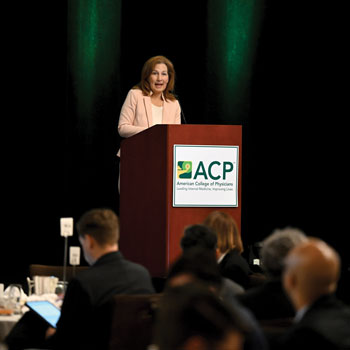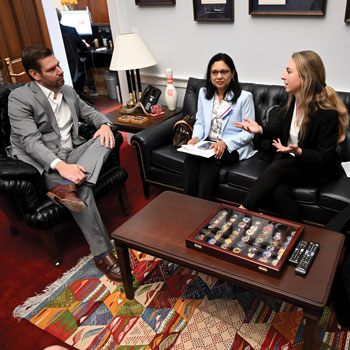Lobbying for residents, payments, and fixes to step therapy
Although it's not in the job description, sometimes the practice of medicine requires political advocacy, as ACP did at Leadership Day.
When ACP members descended on Washington, D.C., for two days in late May, they weren't just another interest group asking Congress for money.
“You're not just speaking for yourself, but you're speaking for the profession, and for the patients that we all take care of, which is unique amongst all the other advocates that are going in with their own agenda,” Jason Goldman, MD, FACP, told attendees at Leadership Day.

Dr. Goldman, ACP Regent and past Governor for ACP's Florida Chapter, was one of several speakers who offered guidance to the internal medicine physicians, residents, and students before they headed to Capitol Hill to meet with legislators.
Priya Radhakrishnan, MD, FACP, Chair of the Board of Governors and Past Governor for the Arizona Chapter, joined him on a panel discussion of experienced ACP advocates. She traced her own activism back to her time as a trainee in India at the beginning of the AIDS epidemic.
At the time, interns and students were tasked with taking blood draws and then cleaning syringes for reuse in the autoclave. “We actually stopped drawing blood, saying that we need disposable syringes, as interns and medical students, and the entire health system had to stop because we would not draw blood,” Dr. Radhakrishnan said.
Although it's not in the job description, sometimes the practice of medicine requires political action, agreed Rep. Mariannette Jane Miller-Meeks, MD (R-IA), a congresswoman and ophthalmologist who spoke at Leadership Day.
“It is critically necessary for you to be here, because in order for you to be able to treat your patients in the best way possible, you have to help legislators fashion policy. We don't have your knowledge and we don't have your experience,” she said.
Effective advocacy requires both the sharing of knowledge and the gathering of information, noted Marianne Parshley, MD, FACP, ACP Regent and former Governor for the Oregon Chapter and a member of the panel that offered ACP members advice before their meetings with legislators.
“I think the most important thing is actually to also listen and to anticipate the emotions that you might run into,” she said. “We don't necessarily have to listen to a monologue, but we do need to hear a little bit of it and acknowledge it. Because why we're here is not to prove a point. We're here to build relationships.”

While they connected with their representatives, Leadership Day participants also had some specific policies to discuss with them, including the Kids' Access to Primary Care Act. Rep. Kim Schrier, MD (D-WA), a pediatrician and congresswoman who sponsored the bill, explained the importance of it before the Hill visits began.
“This is a bill that simply raises Medicaid reimbursement to Medicare levels because right now, as you all know, hospital systems, doctors' offices, many have to put a cap on the number of Medicaid patients that they'll see because they lose money for each patient,” she said. “We want everybody to get care and to have a medical home.”
Also in support of that goal, ACP members asked their representatives to support the Strengthening Medicare for Patients and Providers Act, which would provide an annual inflation update to physician payments under Medicare.
Mariam Dvalishvili, MD, ACP Resident/Fellow Member, made the case for this bill in a meeting with Rep. Gregory Murphy, MD (R-NC). “For 20 years, we haven't seen any increase in Medicare payments to physician practices,” she said. “So coming from a smaller town with a smaller community of physicians and a pretty underserved area, we're not able to get our patients the care that they need. … We're not able to get our patients especially subspecialty visits because they're not accepting any Medicare patients.”
That caught the attention of Rep. Murphy, who is a sports medicine physician. “What specialists are you talking about that don't take Medicare?” he asked.
Dr. Dvalishvili was ready with answers. “The biggest one is rheumatology,” she said. “Psychiatry is a big one. We're flooded with patients.”
The issue of physician shortages resonated with Rep. Murphy. “I feel like I could take up all the time here talking about what's going to happen in the future. Our surgeons are dropping off in five years,” he said. “We're trying to beat the drum on this.”
For legislators who didn't have a background in health care, Leadership Day attendees laid out the physician supply problem in more detail. “By 2034—it doesn't seem that long—there is an estimated shortage of somewhere between 17,000 and 40,000 vacant positions,” Leah Tudtud-Hans, MD, FACP, told Rep. Eric Swalwell (D-CA).
Elena Dennis, ACP Medical Student Member, added perspective on the tragedy of physician shortages and maxed-out residencies. “It's kind of amazing to see medical students who have worked so hard … you have all these very accomplished, very well-rounded people that want to help you, and there's just not enough spots,” she said.
They urged Rep. Swalwell to cosponsor the Resident Physician Shortage Reduction Act, which would add 2,000 Medicare-funded residency slots every year for seven years, and they got a positive reception. “That aligns with how we view health care,” Rep. Swalwell said.
Shagun Bindlish, MD, FACP, educated him about another ACP priority, the Safe Step Act, which would require group health plans to provide exception processes for medication step therapy protocols. “Basically we're asking for some exceptions so that we can easily and safely prescribe the medications without going through repeated prior authorizations,” she said. “Instead of working on the paperwork, we can prioritize our patient care, which is much, much more necessary.”
The final “ask” of the ACP members attending Leadership Day was support for the Resident Education Deferred Interest Act. ACP Resident/Fellow Member Kathleen Maguire, MD, explained it to Rep. Scott Peters (D-CA).
“That allows us to put off—at least until we get the full salary—the interest component of our loans,” she said. “As you probably know, living in San Diego for many years, it's very expensive, and so a lot of our salary actually goes to just the cost of living alone.”
The physicians on that visit also remembered to take Dr. Radhakrishnan's advice on lobbying: “Ask them, ‘How can we help you?’ Because we are the experts in our field.”
Tammy Lin, MD, MPH, FACP, Governor for the Southern California Region III Chapter, asked Rep. Peters if ACP members could do anything for him. “I'd say when you come to the Hill, you've done a good job because you're educating. There are 435 people here. There are some doctors here, but I think it's probably fewer than 10 or 15,” he said. “So it's really important that you're educating people on how you're thinking. … Also, get a relationship with the staff.”
Following his advice, the physicians stopped on their way out the door to exchange contact information with Rep. Peters' staffers.



